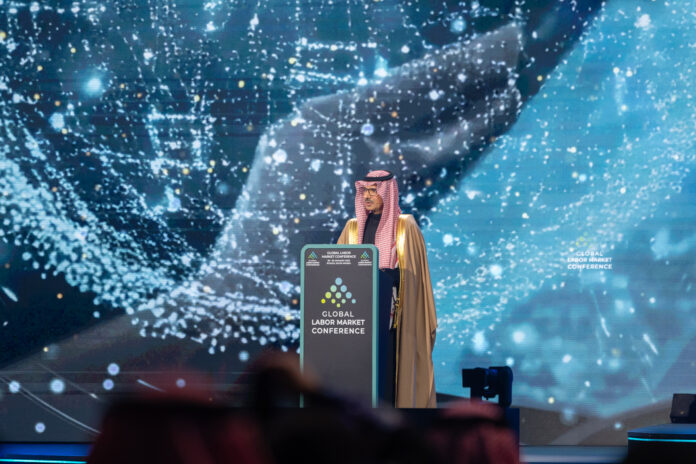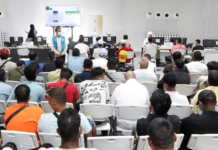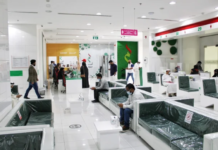
The two-day event gathered around 10,000 attendees and witnessed the signing of over 70 agreements and MoUs
The UAE News Report: The second edition of the Global Labor Market Conference (GLMC), held at King Abdul Aziz International Conference Center in Riyadh, Saudi Arabia, was a huge success, attracting over 10,000 attendees, which included 40 labor ministers and over 200 international speakers.
Held under the theme “The Future of Work,” the two-day GLMC concluded on January 30. The event was organized by the Ministry of Human Resources and Social Development under the patronage of the Custodian of the Two Holy Mosques King Salman bin Abdulaziz Al Saud.
Collaborative efforts
In his opening remarks, H.E. Dr. Abdullah Nasser Abuthnain, Vice Minister of Human Resources and Social Development of Saudi Arabia, underscored how vital collaborations are in driving positive change in the labor market. He cited the GLMC Labor Academy, launched in partnership with the World Bank, as an example.
“The launch of the GLMC and World Bank Labor Academy represented a significant step forward in the global labor market, equipping policymakers with tools to drive impactful labor market reforms in youth employment, social protection integration, and adaptive labor ecosystems,” he noted.
Gilbert Houngbo, secretary-general at the International Labor Organization (ILO), lauded Saudi Arabia’s role in shaping the global labor landscape. He said, “ILO data shows that 240 million people work full-time yet still struggle to meet their basic needs. One of the ILO’s key concerns is the level of inequality, highlighting the need to strengthen social protection — an area where Saudi Arabia excels.”
As Houngbo remarked, the country’s Vision 2030 has been transformative, as it has been instrumental in implementing labor market reforms, such as updated labor laws, enhanced occupational safety, and increased employment opportunities for youth and women.
Transformative deals
During the two-day event, over 70 agreements and memoranda of understanding (MoUs) were signed between government entities and private-sector companies. Collectively, these deals could benefit over 300,000 individuals.
Among those deals were four strategic agreements signed by the Saudi Logistics Academy, reinforcing the country’s status as a leading global logistics hub while enhancing workforce development and aligning skills training with labor market demands.
One agreement with the International Federation of Freight Forwarders Associations (FIATA) focuses on enhancing skills and vocational training in freight and logistics services through shared expertise. Another memorandum with the Spanish ACEX Association aims to develop human resources in road maintenance and operation through specialized training and knowledge exchange. The academy also partnered with Saudi MEDLOG Limited and Mediterranean Shipping Company (MSC) to train and qualify candidates for employment.
Saudi Arabia’s Ministry of Tourism also signed agreements and MoUs at GLMC 2025, and the goal is to boost the skills and quality of the national workforce in the tourism sector.
For instance, a partnership with Marriott Riyadh Hotels Group focuses on employing Saudi nationals, providing training, and ensuring access to job opportunities. Meanwhile, an MoU with Hotel Management Company (Adeera) aims to qualify Saudi workers and prepare job seekers for roles in the tourism industry. Additionally, an agreement with Takamol Business Services Company seeks to improve employee capabilities, uphold quality and safety standards, and enhance tourism services.
AI’s impact on labor market
As with Day 1, the concluding day of GLMC 2025 hosted several insightful sessions. One of the key topics of discussion was Artificial Intelligence (AI).
The session Not Working: Decoding Market Signals About the Future of Work talked about the paradox of abundant job market information and limited labor mobility — and how AI can facilitate labor movement and expand access to global talent pools. Highlighting the stakes involved, Prof. Carl Benedikt Frey, associate professor for AI & Work at Oxford University, said, “The most costly barrier is the barrier to labor mobility. If the 1.1 billion people who wanted to move to the jobs they wanted could, earnings would rise by about $15,000 a year. Collectively, this means leaving trillions on the sidewalk.”
In another session called Leveraging AI and Tech Cross Border Talent, the panel addressed the potential of AI and technology to revolutionize cross-border talent acquisition. The speakers included H.E. Dr. Abdullah bin Sharaf Alghamdi, president of Saudi Data & AI Authority (SDAIA); Cenly Chen, Chief Growth Officer, SVP & MD at Supermicro; and Ed Williams, international president at Edelman.
According to Williams, “Two powerful forces are reshaping work: Cross-border dynamics and AI. For 150 years, the office environment was the primary workplace, but the pandemic changed that in just three years. The second wave is AI. Unlike past revolutions, AI’s impact is exponential.”
The session Gloves Off: Is AI/Technology Really Improving Productivity explored whether AI and advanced technologies are genuinely boosting productivity or merely introducing new complexities. Panelists analyzed the tangible outcomes of these innovations across sectors, weighing successes against challenges such as skill gaps, job displacement, and diminishing returns on tech investments.
The panel comprised Denis Pennel, global labor expert and work futurist; Sven Otto Littorin, former minister of Employment of Sweden; Eng. Khalid Alhogail, MD & CEO at SAPTCO Group; David Barnes, workforce policy consultant at DNBGlobal Consulting; and Christopher Warhurst, professor & director for Institute for Employment Research at the University of Warwick
The role of SMEs
The critical role of small and medium-sized enterprises (SMEs) was also in the spotlight in Day 2 of GLMC 2025.
One session, titled Small But Mighty: Maximizing SMEs’ Job Creation Potential, focused on strategies to help SMEs scale their operations, foster innovation, and access funding. The panel — which included Amanda Pullinger, founder and principal at Global Female Investors Management; Alin Ioaneș, CEO at Rombat SA; and Dr. Ayth Al Mubarak, CEO at The National Center for Family Business — discussed the importance of supportive policies, technological advancements, and robust entrepreneurial ecosystems in enabling SMEs to thrive.
Another session explored the idea of SMEs as leaders in creating “good work”. The panel highlighted how SMEs often promote fair labor practices and diverse job opportunities, sometimes outpacing larger corporations in this area. Speakers here included Virginia Reese Coles, co-founder at Aretas AI, and Waleed Fatani, group CEO at Savola Group.
The role of AI in SMEs was another key topic of discussion. The session, AI in SMEs: Driver or Roadblock for Job Creation?, examined whether the adoption of AI will help SMEs continue to drive job creation or pose challenges as a disruptive force.
Here, Richard Rothenberg, CEO at Global AI, and Sarita Patil, producer at Matchbox Shots talked about whether SMEs will emerge as early adopters of AI or remain late bloomers in integrating the technology.
Youth concerns
The concluding day of GLMC 2025 also marked the launch of the joint GLMC-World Bank Youth Approach Paper. The report tackles the challenges and opportunities faced by youth in transitioning into the labor market. Specifically, it is projected that the Global South will host 1.2 billion youth by 2033. Yet, only 420 million will be employed and 480 million will be in school — leaving 295 million idle.
The session began with an introductory keynote by Jamele Rigolini, senior advisor for Social Protection and Jobs at the World Bank Group, followed by a panel discussion by Dr. Cristobal Ridao Cano, practice manager for MENA SPJ Global at the World Bank Group, and Jude AlThagafi, an MA candidate at Johns Hopkins University.
“The MENA region has the second largest youth population, with more youth entering the labor force. The region is also aging fast; the window of opportunity to realize the potential dividend is short. There’s a big challenge, but little time,” Dr. Cano noted, highlighting the urgency of addressing youth employment challenges in the MENA region — as with the case of other regions in the world.
The paper identified training and employment programs as crucial in addressing skills gaps and labor market constraints faced by youth. Generally, these programs fall into three categories: enhancing employment opportunities, providing targeted training, and facilitating youth integration into the workforce.
In addressing the challenges identified, the private sector also has a vital role to play. Beyond creating jobs, private entities can help in ensuring that training and employment programs address employer needs.
Moreover, self-employment and entrepreneurship were also identified as significant pathways for youth entry into the labor market when wage employment opportunities are limited.
Additionally, globalization presents an opportunity to improve youth employment outcomes. By 2050, high-income countries may face a shortage of 750 million workers. Managed migration policies, such as Global Skills Partnerships, and investments in human capital could allow youth from low-income countries to fill these gaps. Digital platforms were also cited as tools for expanding global job opportunities through remote and gig work.
Carrying the momentum forward
Throughout the two-day event, key figures from both the public and private sectors took part in sessions that dissected solutions to pressing labor market challenges.
Apart from the aforementioned events, there were discussions on targeted immigration, productivity improvement, skills gaps, and green jobs, among others.
In his closing remarks, Abuthnain emphasized the importance of platforms like GLMC.
“The GLMC has reinforced a clear message: Global challenges require global solutions. As we close this year’s edition, let us carry forward its momentum. The themes we explored — youth employment, reskilling, sustainability, and digital transformation — require bold decisions and collective action,” he stated.-abdulbasit@theuaenews.com







































